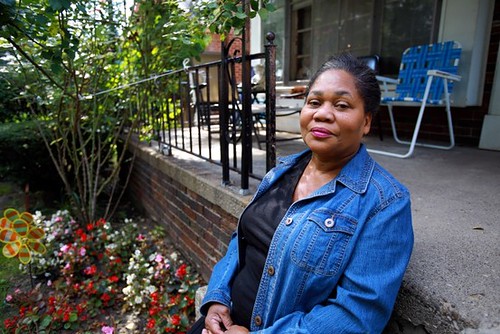
Cynthia Blair, a Detroit pension recipient, is organizing to stop the theft by the banks to retirees and their survivors. Blair testified objecting to the illegal bankruptcy of Detroit., a photo by Pan-African News Wire File Photos on Flickr.
September 18, 2013, 7:29 p.m. ET
Detroit Residents to Voice Pension Fears to Bankruptcy Judge
By MATTHEW DOLAN CONNECT
Wall Street Journal
DETROIT—After weeks of listening to lawyers, the judge in the nation's largest municipal bankruptcy plans to spend Thursday hearing from another group: the worried residents of this financially stricken city.
U.S. Bankruptcy Judge Steven Rhodes granted an unusual audience to 93 people, most of them retired city workers who fear the bankruptcy will mean Detroit won't pay their pensions in full, but some with other grievances. They are seeking to block the city's bid for Chapter 9 protection, which would allow it to restructure an estimated $18 billion in liabilities.
Cynthia Blair, widow of a city police officer, said she would remind the judge that Detroit police don't receive Social Security payments in retirement.
Among those expected to address the judge Thursday is Cynthia Blair, a 59-year-old widow of a police sergeant concerned about potential cuts to her husband's pension. She has been out of work after recovering from injuries from a traffic accident. In a letter to the judge, she protested the power of the city's unelected emergency manager who steered Detroit into bankruptcy court.
When one of her daughters questioned whether appearing in court would make a difference, "I told her I'm not going to take this lying down," Ms. Blair said in an interview.
Ms. Blair said she would remind the judge that the city's police and firefighters don't receive Social Security payments in retirement, adding to worries over any cuts to the $41,000-a-year pension, which she said she relies on to support herself and her two daughters.
According to a draft restructuring plan released in June, Detroit offered to pay about $2 billion to cover $11 billion in unsecured debt. That includes about $3.5 billion in pension obligations, and the city has indicated it is likely pensions will be cut under the plan.
Ms. Blair will have to make her argument quick on Thursday: Judge Rhodes restricted most speakers to a three-minute time limit. The city will have a half-hour to respond. On Tuesday, the judge threw out 17 objections because they were filed late.
Most of those granted time before the judge filled out a standardized form provided by unions, arguing that the city's emergency manager didn't have the legal authority to file for bankruptcy. But others submitted more personal accounts.
Retiree Michael Benson called the city's bankruptcy "illegal and morally wrong." Dwight Boyd, a Detroit resident, questioned why the city was filing for bankruptcy protection when it still owned its valuable water and sewerage department.
Detroit property owner Regina Bryant, meanwhile, fretted about the impact of the bankruptcy on the level of city services, while Lucinda Darrah, a retiree, blamed "predatory and criminal acting banks" for Detroit's financial woes. The judge even granted time to someone simply known as The Chair of St. Peter, whose 21-page objection signed with fingerprints called the city of Detroit a "legal fiction."
The parade of speakers is unusual, if not unprecedented, in the history of Chapter 9 municipal bankruptcies, according to experts and municipal officials. In Stockton, Calif., for example, three residents last fall submitted individual objections to the city's eligibility for bankruptcy protection, according to the city public information officer.
In other cities, unions have typically represented pension holders as a group, possibly reducing such claims. In Detroit, a committee appointed to represent the interests of retirees was only formed after the city's bankruptcy filing in July.
Since 1954, there have been 63 Chapter 9 cases filed and nearly half of them—29—have been dismissed for a variety of reasons. To be eligible for bankruptcy protection, Detroit must show that it is insolvent and bargained in good faith with its creditors, or had too many of them to do so effectively.
City leaders say they have clearly met the bar.
Experts warned that the judge likely won't be swayed simply by the plight of Detroit's retired workers. "If bankruptcy is unpopular, it's not one of the reasons for dismissal," said lawyer James Spiotto, an expert on municipal bankruptcy at Chapman & Cutler law firm in Chicago.
The city's largest creditors—unions, pension funds, banks and bondholders—will also have their say at a hearing scheduled next month.
Many residents in the city say they have few outlets for their protests against Detroit's bankruptcy filing. The city is run by Emergency Manager Kevyn Orr, who has held one public meeting since his appointment in March.
"His primary function is to oversee the restructuring," spokesman Bill Nowling said. "He's not a politician."
Mr. Orr had more than 100 meetings with different groups, including retirees, before Detroit filed for bankruptcy. The city also presented its restructuring plans publicly to creditors in June, giving the parties a chance to try to reach a negotiated settlement before the filing.
But Bill Walton, a 58-year-old former city building supervisor, said the city never bargained in good faith with him and now pleads with the judge to stop the city and its planned pension cuts "because being over 50 years of age, employment opportunities are not so plentiful" in Detroit.
"It has been cut after cut after cut," Mr. Walton said in an interview.
Write to Matthew Dolan at matthew.dolan@wsj.com
No comments:
Post a Comment